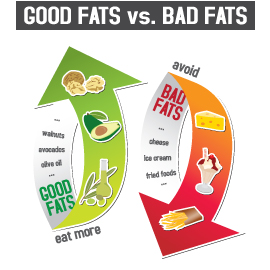
Following your sleeve procedure, your dietary needs will be much different than before your weight loss surgery. Since your gastric sleeve limits the amount of food your stomach can hold, you want to make sure that when you are eating, you are eating foods that are healthy and beneficial to your body. Filling up on empty calories or foods that are high in dietary fats can slow down your weight loss and even lead to weight regain.
To avoid this, it is helpful to know how nutrients and minerals can affect your post-bariatric lifestyle and diet.
Generally, your diet after LAP-BAND should be one that is:
- High in protein
- Low in fat
- Low in calories
- High in fresh fruits and vegetables
- Supplemented with vitamins and minerals if necessary
What are Dietary Fats?
The fats that you consume give your body energy, help absorb essential vitamins and provide essential fatty acids needed in the body. While some fats are essential, too many of the wrong sort or fats can work against your health goals—especially following your LAP-BAND procedure.
Harmful fats following surgery are:
- Saturated fats. Foods high in saturated fat can lead to cholesterol build up in your arteries. Foods containing saturated fats are fatty meats, whole dairy products, ice cream and some vegetable oils.
- Trans fats. Trans fats are formed when vegetable oil is hardened and used to make foods last longer. Foods high in trans fats are usually fried foods or highly processed foods like potato chips and cookies.
Both of these dietary fats can lead to an increase in you LDL, or “bad”, cholesterol levels. An increase in your cholesterol puts you at an increased risk for heart disease, stroke and other serious conditions. One of the goals of your weight loss surgery is to reduce your chances of developing any of these conditions through weight loss. By consuming foods that contain these fats, you can derail the progress you’ve made with your health.
Since your post-surgery diet should be high in protein, you’ll want to be vigilant about the protein you choose. Red meat and chicken can be high in saturated fats, so you want to be sure to choose lean meats and avoid meats such as bacon or sausage.
Healthier dietary fats following Sleeve Surgery are:
- Monounsaturated fats
- Polyunsaturated fats
These fats can raise your HDL, or “good”, cholesterol levels and lower your LDL cholesterol levels. Foods containing these fats include nuts, avocados, flaxseed, tofu, soy milk, peanut butter and fish like salmon, trout or herring. Fish and beans can also be high in protein and when prepared properly, don’t contain excessive calories.
When it comes to your diet following a gastric sleeve procedure you want to work closely with Dr. Bagnato and your weight loss team. However, in order to optimize your weight loss after sleeve surery, be aware of your diet and the types of calories and nutrients you are consuming. By eliminating harmful fats and including healthier fats in moderation, you will be one step closer to your wellness and weight loss goals.

